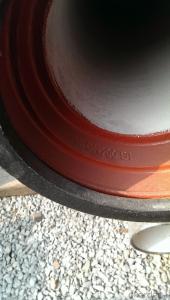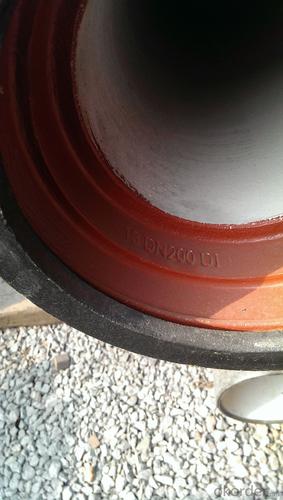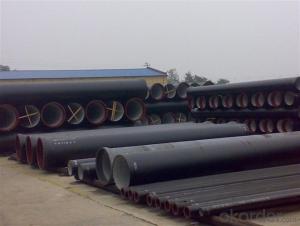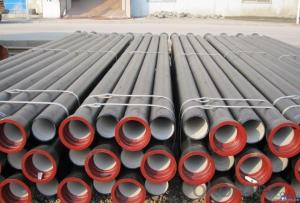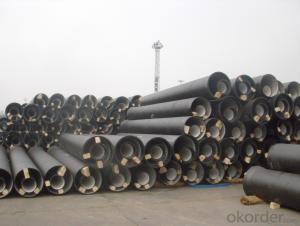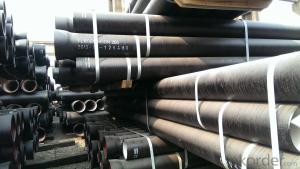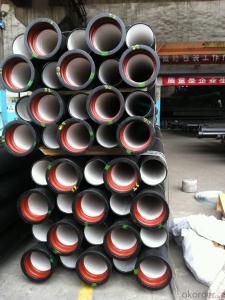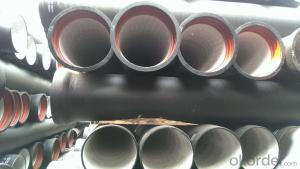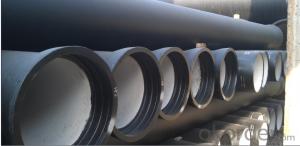DUCTILE IRON PIPE K9 DN 150 SOCKET SPIGOT PIPES
- Loading Port:
- Tianjin
- Payment Terms:
- TT OR LC
- Min Order Qty:
- 25 m.t.
- Supply Capability:
- 30000 m.t./month
OKorder Service Pledge
OKorder Financial Service
You Might Also Like
1) The standard of pipe: ISO2531:1998, EN545:2006,K9 K8
2) Effective length: 6m/5.7m
3) Inner cement line: Portland cement lineas per ISO4179
4) Zinc coating: at least 130g/m2 as per ISO8179
5) Bitumen painting: at least 70μm as per ISO8179
6)With 102% quantity of NBR, SBR, or EPDM ring asper ISO4633
7) DN80-DN1200
8) Highstrength, lighter than grey iron, good corrosion resistance, no furring, smallflow resistance, easy fixing, long life tome about 100 yeas
9)Checked by automatic inspection equipment
10) Composition:
Chemical composition | |||
Chemical composition | Ductile Cast Iron Pipe (%) | Grey iron pipe (%) | Steel pipe (%) |
C | 3.5-4.0 | 3.2-3.8 | 0.1-0.2 |
Si | 1.9-2.6 | 1.4-2.2 | 0.15-0.4 |
Mn | 0.15-0.45 | 0.4-0.6 | 0.3-0.6 |
P | ≤0.06 | ≤0.3 | 0.02-0.03 |
S | ≤0.02 | ≤0.1 | 0.02-0.03 |
Mg | 0.03-0.06 |
|
|
11) Feature:
Mechanical properties | |||
| Ductile Cast Iron Pipe | Grey Iron Pipe | Steel Pipe |
Tensile Strength(Mpa) | ≥420 | 150-260 | ≥400 |
Yield Strength(Mpa) | ≥300 | No Confirmation | No Confirmation |
Bending Strength(Mpa) | ≥590 | 200-360 | ≥400 |
Elongation (%) | ≥10 | Neglected | ≥18 |
Brinell Hardness(HBS) | ≤230 | ≤230 | About 140 |
12) T type mechanical joint
13) Packing: in bulk or container
PACKING: 1) Pipesare bundled together with the steel belt.
2) Wooden pieces are put between the pipes.
- Q: Can ductile iron pipe be used for pressure sewer systems?
- Yes, ductile iron pipe can be used for pressure sewer systems. Ductile iron pipe is known for its strength, durability, and resistance to corrosion, making it a suitable choice for various applications, including pressure sewer systems. It can withstand high pressure and provide a reliable conduit for transporting wastewater under pressure. Additionally, ductile iron pipe has excellent joint integrity, which ensures leak-free connections and minimizes the risk of sewer system failures. Therefore, ductile iron pipe is commonly used in pressure sewer systems due to its structural integrity and long lifespan.
- Q: How does ductile iron pipe perform in seismic areas?
- Ductile iron pipe performs exceptionally well in seismic areas due to its inherent strength and flexibility. Seismic activity can subject pipelines to significant ground movements and vibrations, and ductile iron pipes have proven to be highly resilient in such conditions. The unique properties of ductile iron, including its high tensile strength and ductility, allow it to absorb the energy generated during seismic events. This ability to flex and bend without breaking or fracturing makes it an excellent choice for areas prone to earthquakes. Furthermore, ductile iron pipes are designed and manufactured to withstand external forces and ground movements. They are often installed with flexible joints that can accommodate ground shifts and maintain the integrity of the pipeline system. These joints can absorb lateral and angular movements, reducing the risk of pipe failure. Additionally, ductile iron pipes have a long history of successful performance in seismic areas. They have been extensively tested and proven to meet or exceed industry standards for seismic resistance. This reliability is crucial in ensuring the safety and functionality of water and wastewater systems, even in the event of a seismic event. Overall, ductile iron pipe is a reliable and durable choice for pipelines in seismic areas. Its ability to withstand ground movements, its flexibility, and its proven track record make it an excellent option for ensuring the integrity and functionality of water and wastewater systems in earthquake-prone regions.
- Q: Are ductile iron pipes suitable for use in irrigation sprinkler systems?
- Ductile iron pipes, known for their durability, strength, and corrosion resistance, are a suitable option for irrigation sprinkler systems. With their high tensile strength, they can withstand heavy loads and high pressure, ensuring a consistent water supply. Moreover, their long lifespan reduces the frequency of maintenance and replacement, making them cost-effective. In summary, ductile iron pipes are reliable and appropriate for use in irrigation sprinkler systems.
- Q: What is the average diameter range of ductile iron pipes?
- The average diameter range of ductile iron pipes is typically between 3 inches to 64 inches.
- Q: How are ductile iron pipes joined to fittings and valves?
- Fittings and valves are commonly connected to ductile iron pipes using either flanged connections or mechanical joints. Flanged connections involve the use of circular discs called flanges, which have evenly spaced holes around the edge. These flanges are bolted together to create a tight seal between the pipe and the fitting or valve. To connect a ductile iron pipe to a fitting or valve using a flanged connection, the pipe end is first prepared by cleaning and removing any rough edges. Then, a gasket made of rubber or another suitable material is placed between the pipe end and the flange face. The flange is aligned with the pipe, and bolts are inserted through the holes in the flange, passing through corresponding holes in the fitting or valve. Once all the bolts are in place, they are tightened evenly, gradually applying pressure to compress the gasket and create a secure, leak-proof seal. To ensure proper alignment and sealing, the bolts are typically tightened in a specific pattern or sequence. Alternatively, mechanical joints can be used to join ductile iron pipes to fittings and valves. This involves inserting a rubber gasket or gland into a groove on the pipe end. The fitting or valve also has a corresponding groove, and when the two are brought together, the gasket is compressed to create a tight seal. Mechanical joints offer some flexibility, allowing for slight movement or expansion and contraction of the pipe. This is beneficial in applications where there may be thermal variations or ground movement, as it reduces the risk of pipe failure. Both flanged connections and mechanical joints are widely used in various industries and applications that require the connection of ductile iron pipes to fittings and valves. The choice of joining method depends on factors such as the specific application, pipe size, pressure requirements, and local codes and regulations.
- Q: Why does the cast iron pipe always run off when testing?
- The pipeline is installed, straight section of each pipe will be added pier, concrete pipe, elbow, three links should also have concrete pier, specific installation method according to GB Atlas 03SS515, and the straight pipe to soil, pipeline interface will be exposed, easy to check.
- Q: How can the connection of ductile iron pipe elbow be convenient for connecting?
- Ductile cast iron pipe in the groove pipe connection technology is also called the lathedog connection technology, has become the most liquid and gas pipeline connection technology, although this technology is later than foreign in domestic development time, but because of its advanced technology, domestic market quickly received. Since 1998, it has been developed and applied in just a few years. It has gradually replaced two traditional ways of pipe connection, such as flange and welding. Not only technically more mature, the market is generally recognized, but also by the national laws and regulations actively guide the policy. The application of grooved pipe connection technology makes the complex pipe connection procedure simple, fast and convenient. Took a big step forward in pipeline connection technology.
- Q: Are ductile iron pipes suitable for airport runway drainage?
- Yes, ductile iron pipes are suitable for airport runway drainage. Ductile iron pipes are known for their durability, strength, and resistance to corrosion, making them an ideal choice for handling heavy loads and withstanding harsh environmental conditions typically found on airport runways.
- Q: How do ductile iron pipes handle ground movement due to tree roots?
- Ductile iron pipes have excellent resistance to ground movement caused by tree roots. The material's high strength and flexibility allow it to withstand root penetration and continue to function effectively. Additionally, the joints in ductile iron pipes are designed to accommodate some degree of movement, further minimizing the impact of tree roots on the pipe's integrity.
- Q: Can ductile iron pipe be used for underground applications?
- Yes, ductile iron pipe can be used for underground applications. Ductile iron pipe is known for its strength and durability, making it suitable for various underground applications such as water and sewage systems, gas pipelines, and irrigation systems. Its high resistance to corrosion and external loads makes it a reliable choice for underground installations where long-term performance and structural integrity are important factors. Additionally, ductile iron pipe's flexibility allows it to withstand ground movement and settle without cracking or breaking, making it a suitable option for areas prone to seismic activity.
Send your message to us
DUCTILE IRON PIPE K9 DN 150 SOCKET SPIGOT PIPES
- Loading Port:
- Tianjin
- Payment Terms:
- TT OR LC
- Min Order Qty:
- 25 m.t.
- Supply Capability:
- 30000 m.t./month
OKorder Service Pledge
OKorder Financial Service
Similar products
Hot products
Hot Searches
Related keywords
